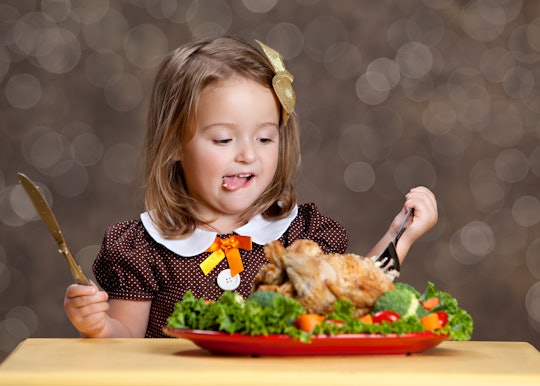Thanksgiving is the day for gratitude and glorious foods. Some of those foods, of course, contain the amino acid that promotes calmness, relaxation, and even drowsiness. Tryptophan is also responsible for producing serotonin, and is used to synthesize proteins. Because our bodies don't make tryptophan, we can only obtain it through diet and nutrition. There's the long-running assumption that eating turkey during a Thanksgiving meal puts everyone in the napping mood, but will it have the same impact on your kids? So, how does tryptophan affect toddlers? The answer doesn't seem to be a matter of just gobbling up the turkey, according to science, but there's hope for all you parents who would like at least an hour, or two, of quiet time post-Thanksgiving meal.
Tryptophan can, in fact, make your toddler sleepy, but there's a catch. Psychology Today reports that for tryptophan to do the thing everyone says it will, is has to be paired with carbohydrates. If you do combine tryptophan with carbohydrates, the body makes insulin, forcing other competing amino acids to go elsewhere so the tryptophan can enter the bloodstream, eventually traveling up into the brain. Otherwise, Psychology Today adds, tryptophan has no more access to the bloodstream or brain than some of the other amino acids in your body. This means eating turkey by itself doesn't guarantee a sleepy toddler (sorry!). Turkey isn't capable of doing the job without those carbs to push the amino acid along, because the amount of tryptophan in turkey isn't more than any other protein (and can even be found in cheese, eggs, nuts, milk, soy, and fish).
Basically, eating chicken or salmon would have the same results, if not combined with the necessary carbs to release serotonin.
Children's National says it's likely the tryptophan isn't even the root cause of any post-meal sleepiness, but instead, the overeating in general. Usually a Thanksgiving meal is carb-heavy, which also triggers the same calming effects tryptophan does, so it's important not to confuse the two. If you don't want your little one to fall asleep after Thanksgiving dinner, try sticking to their normal routines, limiting the starchy foods, and encourage exercise — like a walk — once the meal concludes. Dr. William Sears, pediatrician and author of over 30 parenting books, does remind parents that tryptophan can be great for relaxing the brain if coupled with carbs. To get the opposite effect (i.e. for concentration), make sure your toddler is consuming foods high in tyrosine proteins (another essential amino acid) with little sugar and carbs.
The Baby Sleep Site says you should also consider the timing of when your toddler consumes any tryptophan-heavy foods based on whether or not you want them to experience the calming effects. Kids shouldn't have a large meal an hour, or less, before bedtime because doing so raises their metabolic rate and body temperature, making sleep difficult to accomplish. The same site also suggests making the midday meal the biggest — not dinner — whether it's tryptophan-laden or not. Offering a snack with low sugar content 10 minutes before bed may aid in a better night's sleep as well. To cash in on tryptophan's calming abilities, be sure to utilize that snack as being a protein with a complex carb for maximum benefit.
Tryptophan, no doubt, affects everyone — including toddlers — but again, it's not without the necessary counterparts (i.e. carbohydrates). Without that "magical" combination, tryptophan won't react and release into your bloodstream. When it comes down to it, tryptophan doesn't really affect your toddlers any more than it affects you. If you're paying attention to the timing, size of meals, and balancing the nutrition, it'll have as much affect as having chicken or fish. Great for the protein (and health), but that's about it.
Check out Romper's new video series, Romper's Doula Diaries:
Watch full episodes of Romper's Doula Diaries on Facebook Watch.
